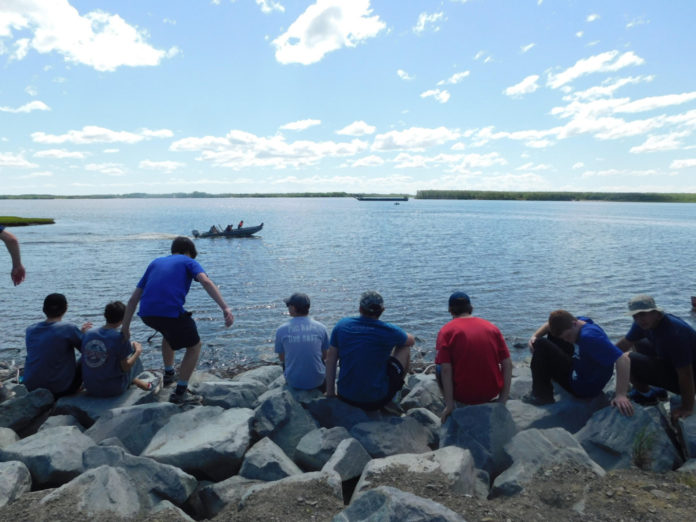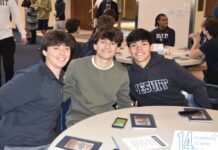Nearly scraping the Arctic circle and only miles away from Russia, sunny skies and frigid temperatures characterize, Bethel, a conglomeration of towns in southwest Alaska which service about 75 running fishing villages that range up to 4 or 5 hours upriver. As the ninth-most populous city in Alaska, with just over 6,300 people, this may seem like an unordinary place to host an immersion trip, yet the Jesuit students who went had a very positive experience on the trip. Over this past summer, 9 students and 3 faculty members traveled to Bethel, Alaska in a cultural immersion trip to taste what life is like there. They were able to experience the great differences between life in Dallas versus life in Bethel.
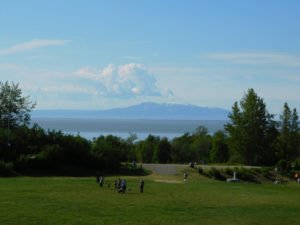
For the past several years, Jesuit has taken immersion trips to Alaska. This year, it was again led by Mr. Patterson, and according to him, he enjoyed going on the trip “to help guys experience” what it is like in Alaska. This was Mr. Patterson’s fourth time travelling to Alaska on the immersion trip, and he has been coordinating this trip for four years.
On the trip, the students and faculty maintained the fish-camps by doing yard work around Bethel. They also spent time at the fish and wildlife center learning about some social programs that assist with the church. They were able to experience a unique culture there, where there was a community much different than that of Dallas, and as Nicholas Villareal ‘18 remarked, he went on the trip “because it seemed different than most of the other immersion trips.” Even though this city is still part of the United States, the differences between life there and in Texas are enormous.
One large difference, as Villareal said, was “how hard and expensive it is to get the simple things. Toothpaste, bread, and soap is all more expensive [there] and that isn’t even including the $6 gas.”
Colin White ‘18 remarked that another difference between Bethel and Dallas was that the citizens there “have to prepare for the winter by fishing in a span of only two months.” In Dallas, the norm of buying food is by going to the grocery store, but in Alaska, the people need to plan far in advance to ensure that they have enough food for the rough winters because they are subsistence-living.
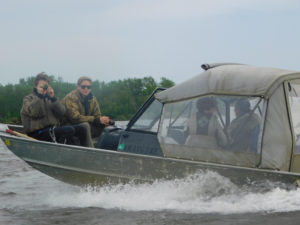
White went on to say that people in Bethel “struggle with government regulations that restrict the fishing season, because every day counts.” Because fishing is one of the best ways to get plenty of food there, the people want to catch as many fish as possible. However, with certain regulations, it can be hard for them to catch enough fish to sustain themselves.
Despite all of these difficulties, people in Bethel still choose live there. Mr. Shoemaker remembers talking to a man who explained that everything is an ordeal to accomplish, yet they continue to say because “it’s their home; [the residents] are not going to leave.”
Those who went on the trip stayed at Immaculate Conception Catholic Church in Bethel, which was where they learned most about life in the Alaskan Bush. Additionally, they completed many service projects at the church to keep it running. Mr. Shoemaker said that he “liked [the trip] a lot” because “it’s a very unique trip in that everything is kind of laid back up there.” He said that there was “a lot of reflective downtime” for the students to empathize with the inhabitants of Bethel.
When asked about his favorite part of the trip, Colin White responded by saying that “one of the last nights when we went to a fish camp” was his favorite, because it was “where they gut fish for the winter.” He also enjoyed hanging out with the locals by “play[ing] basketball and … see[ing] how they spent their free time.”
As for Nicholas Villareal, his favorite part of the trip was “getting to know all the people at the countless dinner parties we had. Whether it was Stan, the local barber, grilling salmon at the church where he brought his own spatula, or if it was when we
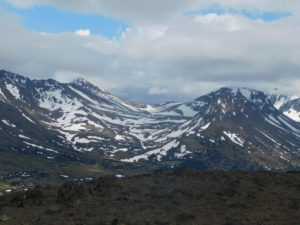
were eating aged salmon from a jar with the father that was with us while tending a fire.” He also remembered when a he and a local citizen “got to go watch people ride their snowmobiles on water.”
On their unique trip, the group tasted the hardships and burdens of life in Alaska, such as freezing temperatures, many hours of daylight or darkness, and very expensive items. They got to bond with each other and with the people there, which embodies the motto “Men for Others.”
Check back to The Roundup for more service and immersion trip news!


